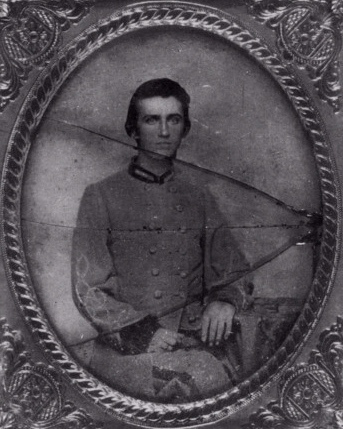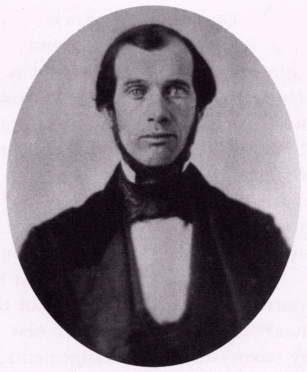Honor Role
Rockville residents
that served in the Civil War
This is a list of Rockville residents (or thereabouts) that
served during the Civil War. This list is not comprehensive, but assembled
from documentary fragments on the subjects. We regret an omission by a
lack of our knowledge. If you can provide documentation on anyone please
contact Peerless Rockville
or the webmaster for this site.
Nathaniel Warren
Mariner, U.S. Navy (Union)
Nathaniel Warren
was a free black resident of Rockville, who enlisted as a mariner in the
U.S. Navy in Philadelphia in 1859, at the age of twenty-four. Thus, he
was already in regular (Union) service before the war. [Note: the U.S.
Navy was integrated by race prior to the Civil War.] Details of
his service are not known. He served throughout the war and returned to
Rockville afterward.
William Veirs Bouic
Captain, Rockville Rifles (pre-war milita)
William Veirs Bouic commanded (with militia rank of captain)
the Rockville Rifles, a local militia based in town prior to the war.
The militia consisted of local residents that were organized and trained, by
loose military standards, for civil defense functions--similar to National
Guard units today. Union army officials disbanded this militia unit and
confiscated their weapons upon arriving in town during the Rockville
Expedition, in 1861. With known Confederate sympathies in Rockville (and
being commanded by Mr. Bouic as a prominent and outspoken secessionist),
having an armed militia unit in Rockville was considered a military risk to
Union forces in the area. Later in 1861, Mr. Bouic was arrested briefly
for attending a disloyal meeting.
Mr. Bouic was variously a lawyer, farmer, state's attorney,
Town Commissioner (1861-67) and judge. He did not serve in a further
military capacity during the war.
Levi Hoskinson
Private, Company H, 7th Virginia Infantry,
"the Washington Volunteers" (Confederate)
Levi Hoskinson was the first casualty among
Rockville soldiers. He was killed at the First Battle of Bull Run
(Manassas), July 21, 1861. His obituary, reporting the circumstances of
his death, appeared in the Montgomery County Sentinel, in December.
About 4:00pm on July 21, the 7th Virginia Infantry was advancing uphill to
attack already retreating Union forces. The Confederates were shelled by
Union artillery covering the Union infantry withdraw. Levi was killed by
this artillery fire. In civilian life, he was a printer for the same
newspaper, likely working in the printing office at the SE corner of
Washington Street and Commerce Lane (today: W. Montgomery Lane; this site is
now occupied by the "old" post office).
Levi volunteered early in the war for the
Confederacy. His unit initially formed in May of 1861 in Alexandria, VA,
mostly from Secessionist enlistees from Washington DC and the surrounding
countryside. But when the unit went to enlist formally, Confederate army
ranks had withdrawn to Culpeper, as Alexandria was viewed as indefensible due
to proximity to Washington City and exposure on the river front, controlled by
Federal gunboats. So this fresh unit reformed in Culpeper and enlisted
there. Some confusion ensued as to how to designate the unit, as this
was typically done by state, but accepting a unit designated from the Federal
capital was not thought proper. So it was assigned and absorbed into the
7th Virginia Infantry (from central portions of that State) which became a
magnet for other likewise "orphan" units.
Mortimer Moulden
Provost Marshal, Rockville, Maryland (Union)
Mortimer Moulden was a clerk of the court. He lived on
Jefferson Street; he was thirty-five in 1861. He was appointed as
Provost Marshal when the Union Army formally occupied the town during the
Rockville Expedition. A Provost Marshal is the military administrator
for a civilian jurisdiction, in wartime. He nominally commanded the
garrison and was responsible for all Federal interests in the Town. He
reported disloyal citizens that aided rebel marauders or passed
information. He wrote "Is the Government aware that a letter could
be thrown across the river at the Falls by wrapping it around a stone, thus
giving the rebels a chance to learn our movements? And there are plenty
of rebel sympathizers to do it."
George Patterson
Teamster, 11th New York Cavalry (Union)
George Patterson was a free (black) man. He enlisted
in the Union army in the late summer of 1862, prompted by President Lincoln
signing an emancipation bill for slaves in the District of Columbia. At
this stage, black recruits were not assigned fighting posts, likely leading to
George's assignment as a teamster (supply wagon driver).
James Anderson
Captain, Company D, 35th Battalion, Virginia Cavalry
(Confederate)
James Anderson volunteered in 1862 for
Confederate service, at the age of thirty-three. He joined the cavalry unit led by Elijah
Veirs White (35th Battalion, Virginia Cavalry), whom recruited many
Montgomery County residents into service in the Confederate cause.
James rose to the rank of captain. He was captured twice and held
as a prisoner variously in Baltimore, Washington, Ohio, Delaware and
South Carolina. An interesting side story is that James' father,
James Wallace Anderson lost his job at the post office in Washington for
refusing to sign a loyalty oath in May 1861. That oath likely
would have had him disavow his son and foresworn any support or comfort
for him while serving in the Confederate army.
James Anderson was a teacher and surveyor as a
civilian before the war. He returned to live on his family farm
and to education as a profession
after the war, but as an administrator. He became one of the
earliest administrators of public schools in Montgomery County and
helped form the Montgomery County Public School system.
|

Montgomery County Historical Society
|
Edward Wootton
[rank unknown], 35th Battalion, Virginia Cavalry
(Confederate)
Edward Wootton joined the cavalry unit led by Elijah Veirs
White (35th Battalion, Virginia Cavalry) in 1862, whom recruited many
Montgomery County residents into service in the Confederate cause.
Lawrence Dawson
Draft Commissioners (Union)
Lawrence Dawson owned the Rocky Glen Farm just south of
Town. His home is preserved in the historic district at Dawson Farm Park
(in the Hungerford neighborhood). In mid-1862, he was appointed as a
draft commissioner. He served as an enrollment officer for
Rockville. This was a very unpopular job, that of enrolling and
selecting your neighbors sons for military service. In Rockville,
resentment was compounded by the Southern sympathies in Town, against
involuntary service in the Union army. The Dawson family was
"ostracized from society." Lawrence Dawson was among those
arrested by JEB Stuart's Confederate cavalry when they visited Rockville,
undoubtedly for this position. The rest of the Montgomery County Draft
Board was John Higgins (of Rockville), Richard Williams (clerk) and John
DeSellum (of Gaithersburg).
John Higgins
Draft Commissioner (Union)
| John Higgins was a
merchant. He owned and operated Higgins Store off Courthouse
Square. His home still stands at the NE corner of Middle Lane and
Adams Street. In mid-1862, he was appointed as a draft
commissioner. This was a very unpopular job, that of enrolling and
selecting your neighbors sons for military service. In Rockville,
resentment was compounded by the Southern sympathies in Town, against
involuntary service in the Union army. John Higgins was among
those arrested by JEB Stuart's Confederate cavalry when they visited
Rockville, undoubtedly for this position. His wife Dora provides
the best local account of this episode in a letter. The rest of
the Montgomery County Draft Board was Lawrence Dawson (of Rockville),
Richard Williams (clerk) and John DeSellum (of Gaithersburg). |

Montgomery County Historical Society |
James Barber
[rank and unit unknown] (Union)
James Barber was a slave owned by Olivia Wootton. He
enlisted in late 1863, perhaps because of a bounty offered by the State of
Maryland to black soldiers, or perhaps as a paid replacement in the
draft. Details of his service are not known.
Reuben Hill
[rank and unit unknown] (Union)
Reuben Hill was a slave owned by Samuel Stonestreet.
He was drafted into service in the Union army in 1864. His owner
received compensatory payment from the Federal government. Details of
his service are not known. He returned to Rockville after the war and
lived in the Lincoln Park neighborhood.
William Preston
Private, 28th Regiment, U.S. Colored Troops (Union)
William Preston was a slave owned by Chandler Keys. He
was drafted into service in the Union army in 1864. His owner received
compensatory payment from the Federal government. Details of his service
are not known.
Dr. Edward Stonestreet
Draft Medical Examiner (Union), Doctor (no side
taken)
Dr. Stonestreet served as a medical examiner for the Union
draft in Montgomery County. In October 1862, he exempted 233 county men
for medical reasons (including rupture [hernia], lung disease, deafness,
rheumatism, mental derangement, spinal disease, and hemorrhoids).
Dr. Stonestreet also served as the town doctor and treated
assorted military wounds and injuries in the local area. In the best
tradition of his profession, he appears to have done so based on treatment
need, not political persuasion.

